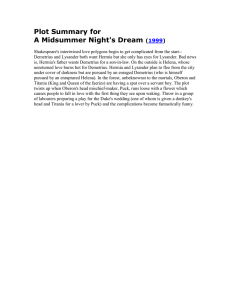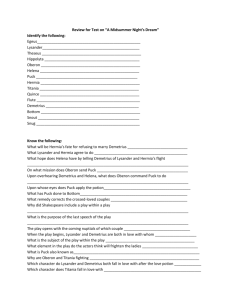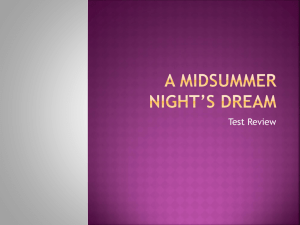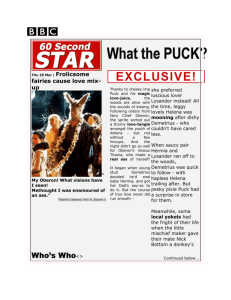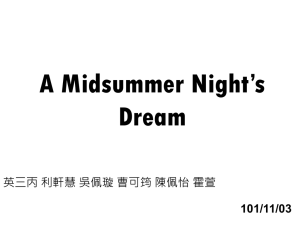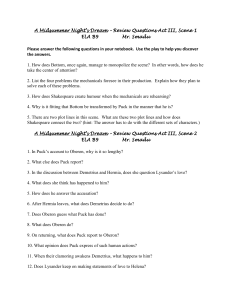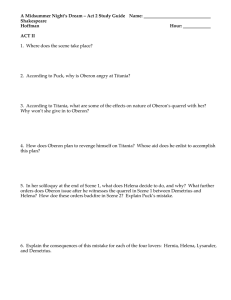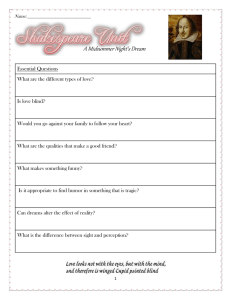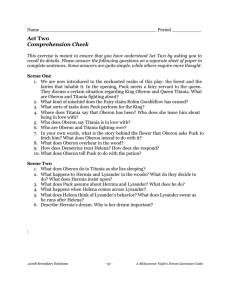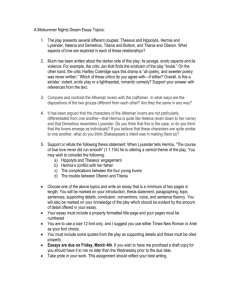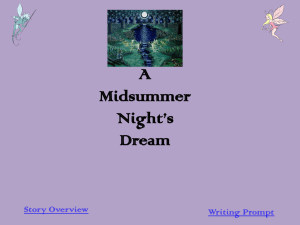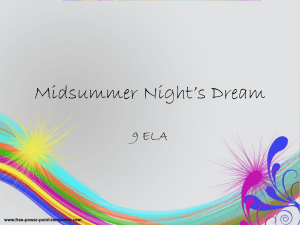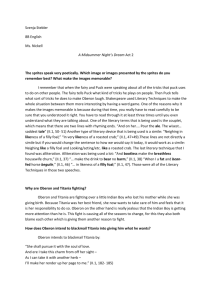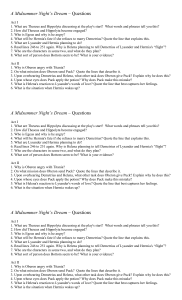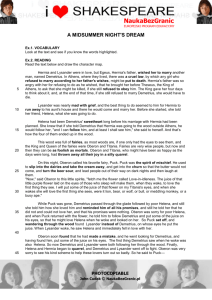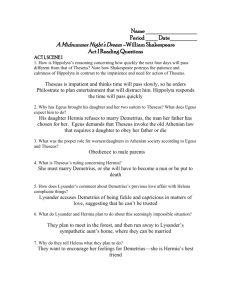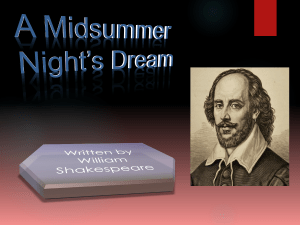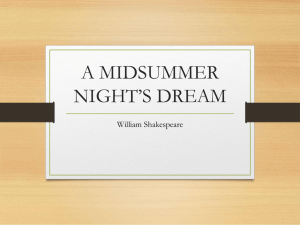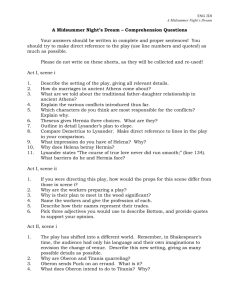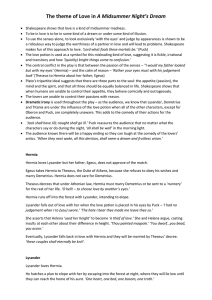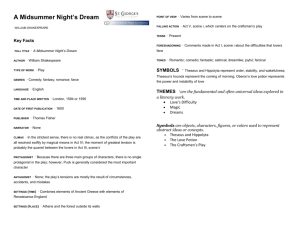Key passages in A Midsummer Night`s Dream
advertisement
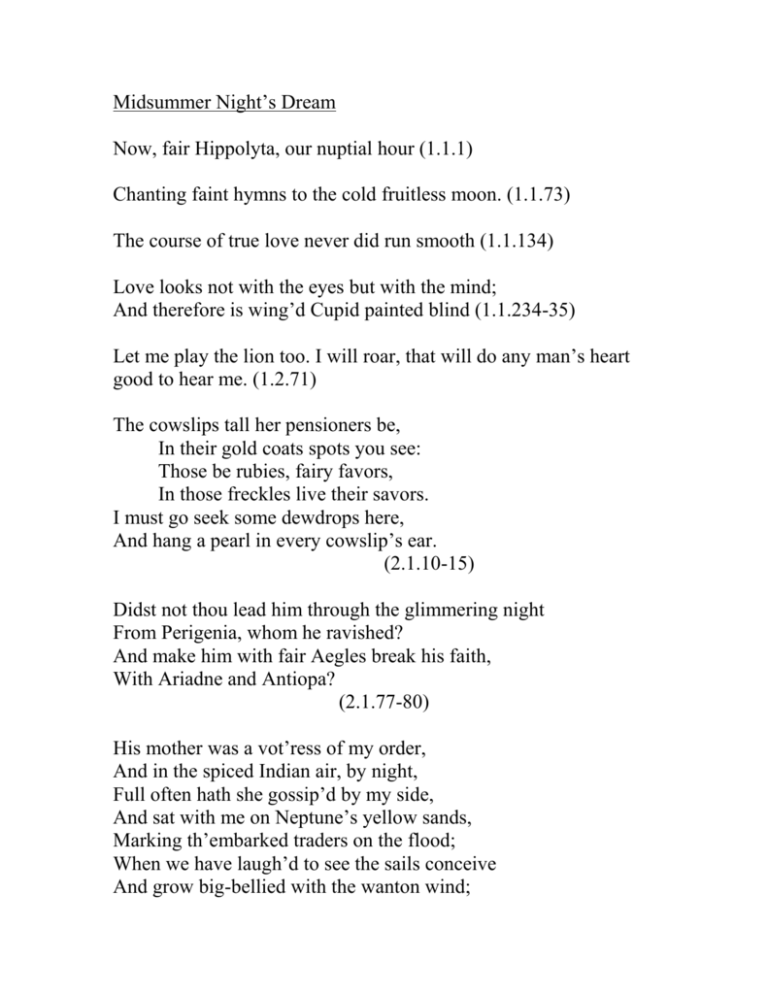
Midsummer Night’s Dream Now, fair Hippolyta, our nuptial hour (1.1.1) Chanting faint hymns to the cold fruitless moon. (1.1.73) The course of true love never did run smooth (1.1.134) Love looks not with the eyes but with the mind; And therefore is wing’d Cupid painted blind (1.1.234-35) Let me play the lion too. I will roar, that will do any man’s heart good to hear me. (1.2.71) The cowslips tall her pensioners be, In their gold coats spots you see: Those be rubies, fairy favors, In those freckles live their savors. I must go seek some dewdrops here, And hang a pearl in every cowslip’s ear. (2.1.10-15) Didst not thou lead him through the glimmering night From Perigenia, whom he ravished? And make him with fair Aegles break his faith, With Ariadne and Antiopa? (2.1.77-80) His mother was a vot’ress of my order, And in the spiced Indian air, by night, Full often hath she gossip’d by my side, And sat with me on Neptune’s yellow sands, Marking th’embarked traders on the flood; When we have laugh’d to see the sails conceive And grow big-bellied with the wanton wind; 2 Which she, with pretty and with swimming gait, Following (her womb then rich with my young squire) Would imitate, and sail upon the land To fetch me trifles, and return again, As from a voyage, rich with merchandise. (2.1.123-34) That very time I saw (but thou couldst not), Flying between the cold moon and the earth, Cupid all arm’d. A certain aim he took At a fair vestal throned by the west, And loos’d his love-shaft smartly from his bow, As it should pierce a hundred thousand hearts; But I might see young Cupid’s fiery shaft Quench’d in the chaste beams of the wat’ry moon, And the imperial vot’ress passed on, In maiden meditation, fancy-free. (2.1.155-64) The wildest hath not such a heart as you. Run when you will; the story shall be chang’d: Apollo flies, and Daphne holds the chase. (2.1.229-231) Ovid's Metamorphoses I know a bank where the wild thyme blows, Where oxlips and the nodding violet grows (2.1.249-59 Help me, Lysander, help me! do thy best To pluck this crawling serpent from my breast! Ay me, for pity! what a dream was here! (2.2.146) 3 I will walk up an down here, and I will sing, that they shall hear I am not afraid. (3.1.123) Their sense thus weak, lost with their fears thus strong, Made senseless things begin to do them wrong. For briers and thorns at their apparel snatch (3.2.27-29) 3 switches: 1) Puck anoints Lysander instead of Demetrius with love-inidleness. 2) Oberon anoints Demetrius. 3) Oberon gives Puck a liquor to remove error for Lysander’s eyes. (So Lysander’s love for Hermia is natural, in the end; but that of Demetrius for Helena is induced.) I was with Hercules and Cadmus once, When in a wood of Crete they bay’d the bear With hounds of Sparta. Never did I hear Such gallant chiding . . . I never heard So musical a discord, such sweet thunder. (4.1.112-18) My hounds are bred out of the Spartan kind; So flew’d, so sanded; and their heads are hung With ears that sweep away the morning dew; Crook-knee’d and dewlapp’d like Thessalian bulls; Slow in pursuit; but match’d in mouth like bells, Each under each. (4.1.119-24) I have had a most rare vision. I have had a dream, past the wit of man to say what dream it was. Man is but an ass, if he go about to expound this dream. (4.1.204 ff.) 4 Flute: And the Duke had not given him sixpence a day for playing Pyramus, I’ll be hang’d. He would have deserv’d it. Sixpence a day in Pyramus, or nothing. Bottom: Where are these lads? Where are these hearts? The lunatic, the lover, and the poet Are of imagination all compact. .... How easy is a bush suppos’d a bear! (5.1.7 ff.) “The riot of the tipsy Bacchanals, Tearing the Thracian singer in their rage.” .... “The thrice three Muses mourning for the death of Learning, late deceas’d in beggary.” (5.1.48 ff.) If we offend, it is will our good will. That you should think, we come not to offend, But with good will. To show our simple skill, That is the true beginning of our end. Consider then, we come but in despite. We do not come, as minding to content you, Our true intent is. All for your delight We are not here. That you should here repent you, The actors are at hand; and, by their show, You shall know all, that you are like to know. If we offend, it is will our good will that you should think we come not to offend, but with good will. To show our simple skill— that is the true beginning of our end. Consider then, we come. But in despite we do not come, as, minding to content you, 5 our true intent is all for your delight. We are not here that you should here repent you. The actors are at hand, and by their show, you shall know all that you are like to know. Nor mark prodigious, such as are Despised in nativity, Shal upon their children be. (5.1.412-414) Action 1.1: Lysander, having agreed to keep away from Hermia for a day before they leave for the forest the next night, prays that Demetrius will dote on Helena. (225) 1.2: Bottom leads the other actors, despite their misgivings, into agreeing to rehearse “most obscenely and courageously.” 2.1 Even as he vows revenge on Titania, Oberon sends Puck to straighten out Demetrius (Lysander’s prayer). 2.2 The fairies guard Titania against nightmares, but not Hermia. 3.1 Puck transforms Bottom. 3.2 Helena accuses the other three lovers of conspiracy against her. 4.1 Theseus cancels the morning hunt—and the overrides the law of Athens (making the women happy). 5.1 Theseus accepts the good service of the Athenian players and is rewarded by Oberon with a blessing on his house. Puck denies that there is any meaning to the play, but a dream. 6 Added May 2005: But Puck is wrong (just like him). The dream is the limitation or education of aristocratic and patriarchal power by the powerless--women, fairies, working men—to produce social harmony. The result is justice, according to Socrates, whose paradox is that no one is unjust willingly (for then he would promote his own harm). (Evil dictators or insurgents do bad things because, paradoxically, because they think they are doing good.) Notice the triumph of love over force: Shakespeare is always deeply religious, but never sectarian, a lesson for us all. (
